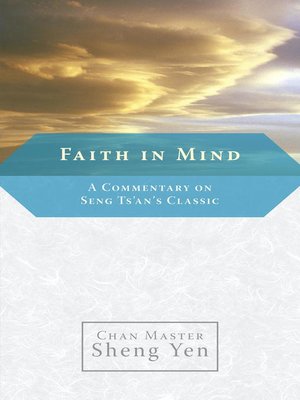
Sign up to save your library
With an OverDrive account, you can save your favorite libraries for at-a-glance information about availability. Find out more about OverDrive accounts.
Find this title in Libby, the library reading app by OverDrive.



Search for a digital library with this title
Title found at these libraries:
| Library Name | Distance |
|---|---|
| Loading... |
The Supreme Way is not difficult
If only you do not pick and choose.
Neither love nor hate,
And you will clearly understand.
Be off by a hair,
And you are as far from it as heaven and earth.
These vivid lines begin one of the most beloved and commented upon of all Zen texts, the Hsin Hsin Ming ("Faith in Mind"), a sixth-century poem by the third Chan patriarch, Seng Ts’an. The Hsin Hsin Ming is a masterpiece of economy, expressing the profoundest truth of the enlightened mind in only a few short pages. Master Sheng Yen’s approach is unique among commentaries on the text: he views it as a supremely useful and practical guide to meditation practice. "I do not adopt a scholarly point of view or analytical approach," he says. "Rather, I use the poem as a taking-off point to inspire the practitioner and deal with issues that arise during the course of practice. True faith in mind is the belief grounded in realization that we have a fundamental, unmoving, and unchanging mind. This mind is precisely Buddha mind."
If only you do not pick and choose.
Neither love nor hate,
And you will clearly understand.
Be off by a hair,
And you are as far from it as heaven and earth.
These vivid lines begin one of the most beloved and commented upon of all Zen texts, the Hsin Hsin Ming ("Faith in Mind"), a sixth-century poem by the third Chan patriarch, Seng Ts’an. The Hsin Hsin Ming is a masterpiece of economy, expressing the profoundest truth of the enlightened mind in only a few short pages. Master Sheng Yen’s approach is unique among commentaries on the text: he views it as a supremely useful and practical guide to meditation practice. "I do not adopt a scholarly point of view or analytical approach," he says. "Rather, I use the poem as a taking-off point to inspire the practitioner and deal with issues that arise during the course of practice. True faith in mind is the belief grounded in realization that we have a fundamental, unmoving, and unchanging mind. This mind is precisely Buddha mind."







